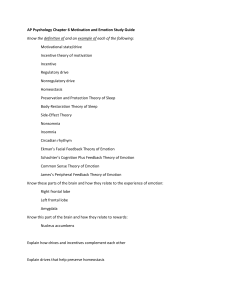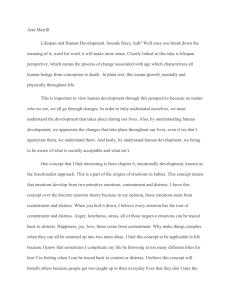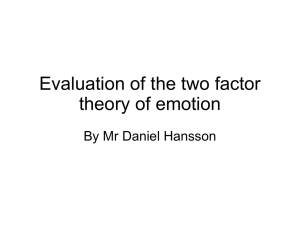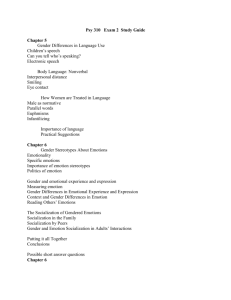Student Survey
advertisement
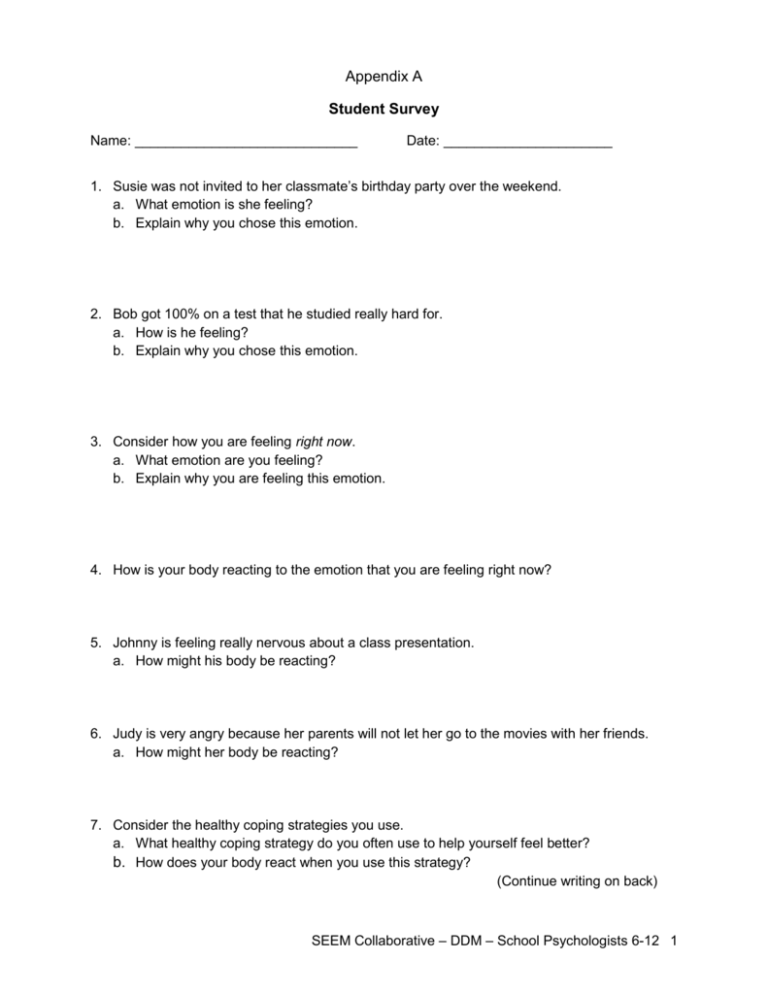
Appendix A Student Survey Name: _____________________________ Date: ______________________ 1. Susie was not invited to her classmate’s birthday party over the weekend. a. What emotion is she feeling? b. Explain why you chose this emotion. 2. Bob got 100% on a test that he studied really hard for. a. How is he feeling? b. Explain why you chose this emotion. 3. Consider how you are feeling right now. a. What emotion are you feeling? b. Explain why you are feeling this emotion. 4. How is your body reacting to the emotion that you are feeling right now? 5. Johnny is feeling really nervous about a class presentation. a. How might his body be reacting? 6. Judy is very angry because her parents will not let her go to the movies with her friends. a. How might her body be reacting? 7. Consider the healthy coping strategies you use. a. What healthy coping strategy do you often use to help yourself feel better? b. How does your body react when you use this strategy? (Continue writing on back) SEEM Collaborative – DDM – School Psychologists 6-12 1 Appendix B Student Journal Prompts 1. Think of a situation in the past two weeks when you experienced an unpleasant emotion. a. Describe the situation. b. Describe the emotion you felt. c. Describe how your feeling affected your body. 2. Think back to the coping strategy that you used to improve this situation. a. Name the coping strategy and explain the steps that you used. 3. Explain why you chose to use this particular coping strategy. 4. Describe how the coping strategy helped. OR If the coping strategy did not help, describe what other healthy coping strategy you ci use if this situation happened again. SEEM Collaborative – DDM – School Psychologists 6-12 2 Appendix C Student Interview Checklist (for Teacher Use) Adult Prompt Acceptable Response 1. What is your current emotion or feeling? Notes: Student labels current state with a relevant emotion word (e.g., sad, angry, frustrated) If needed, first prompt: Take another look through the emotion cards. Is there one that shows how you are feeling today? 2. On a scale from 1 to 5, with 1 being completely calm and 5 being very intense and overwhelmed, what is the intensity of the emotion you are feeling right now? Notes: Student identifies intensity of feeling on a provided scale from 1 to 5. If needed, first prompt: Remember, the first picture shows a calm face because the emotion is very mild at this end of the scale. Each picture shows a little more intensity to the emotion. At this end, you would be having a very hard time controlling your emotions because they would feel super intense and overwhelming. Where on the scale would you say you are feeling right now? 3. How is your emotion or feeling affecting your body? Notes: Student links current feeling to one or more physical symptoms that typically occurs in concert with the emotion identified. Yes Demonstrated Independently Yes Demonstrated with 1 Prompt Yes Demonstrated with Multiple Prompts No Did Not Demonstrate Despite Prompts No Opportunity to Demonstrate Not Relevant 5 4 2 0 n/a 5 4 2 1 n/a 7 5 3 0 n/a SEEM Collaborative – DDM – School Psychologists 19 If needed, first prompt: Think about how the inside of your body feels right now - your muscles, your heart beat or pulse, your hands and legs, your head, neck and shoulders. Where in your body do you feel your emotions right now? Can you describe how your emotions are making your body feel? 4. Name a healthy strategy for coping with this emotion. Notes: Student identifies a coping strategy that would normally reduce the intensity of the identified emotion and support productive interactions. If needed, first prompt: What strategies can you recall that we have worked on together this year? Would any of these be helpful for coping with the emotion you are feeling right now? 5. Review the steps and try to use this coping strategy right now. Notes: Student tells the steps and applies the coping strategy in the moment. If needed, first prompt: What is the very first step you need to take to use this strategy? What do you need to do after that? Keep going, take me through the steps. Then try the steps. 6. Using our scale from 1 to 5, what is the intensity of the emotion or feeling now? (If the emotion is not calmed down yet, ask, “What Student indicates that the intensity of the emotion has decreased and, if needed, describes steps that could further reduce the intensity 9 6 3 0 n/a 9 6 3 0 n/a 9 6 3 0 n/a SEEM Collaborative – DDM – School Psychologists 20 could help to further reduce the intensity of the emotion?”) Notes: of the felt emotion. If needed, first prompt: Remember, the first picture shows a calm face because the emotion is very mild at this end of the scale. Each picture shows a little more intensity to the emotion. At this end, you would be having a very hard time controlling your emotions because they would feel super intense and overwhelming. Where on the scale would you say you are feeling right now? TOTAL SCORE Special Accommodations Provided: / 44 Rationale for Accommodations Provided: SEEM Collaborative – DDM – School Psychologists 21 Appendix D Student Survey Scoring Guide (For Teacher Use) Fully Correct Responses: - Answers all parts of the question and - Provides relevant and plausible responses for all parts Partially Correct Responses: - Answers some parts of the question or - Answers all parts, but not always relevant or plausible responses Not Correct Responses: - Answers are incomplete and/or - Answers are not relevant or plausible Student Name: # 1 2 3 4 5 6 7 Question Date: Guidance Susie was not invited to her classmate’s birthday party over the weekend. - What emotion is she feeling? - Explain why you chose this emotion. Student identifies how he/she might feel and explains why this feeling might be likely after being left out of event by a peer Bob got 100% on a test that he studied really hard for. - How is he feeling? - Explain why you chose this emotion. Student identifies a positive feeling related to accomplishment Consider how you are feeling right now. - What emotion are you feeling? - Explain why you are feeling this emotion. Student names an actual feeling or emotion, rather than a description, an example, a wish, or other response Student describes feeling in the body that connects with the listed emotion Student describes a feeling related to an undesired activity How is your body reacting to the emotion that you are feeling right now? Johnny is feeling really nervous about a class presentation. - How might his body be reacting? Judy is very angry bc her parents will not let her go to the movies with her friends. - How might her body be reacting? Consider healthy coping strategies you use. - What healthy coping strategy do you often use to help yourself feel better? - How does your body react when you use this strategy? Special Accommodations Provided: Examples of Correct Responses Sad, mad, lonely Susie would probably feel angry because it is not kind to leave friends out of a special event. Proud, excited, happy Bob would feel proud because he probably studied really hard to get every question right. Fully Correct Partially Correct Not Correct 5 2 0 5 2 0 5 2 0 7 3 0 7 3 0 Angry, frustrated, sad Angry: Trembling, pit in stomach Sad: Lack of energy Tense: I have a headache Sweating, racing heart, stomach ache Student describes physical symptoms related to anger Tense, hot, pit in stomach, verbal outburst, shaking 7 3 0 Student identifies a healthy, productive coping strategy and describes how his/her body reacts in response Go for walk: calms my mood Breathe deeply: relax muscles Count to 100: distracts me 8 4 0 TOTAL SCORE Rationale for Accommodations Provided /44 SEEM Collaborative – DDM – School Psychologists 22 Appendix E Journal Prompts Scoring Guide (For Teacher Use) Fully Correct Responses: - Answers all parts of the question and - Provides relevant and plausible responses for all parts Partially Correct Responses: - Answers some parts of the question or - Answers all parts, but not always relevant or plausible responses Not Correct Responses: - Answers are incomplete and/or - Answers are not relevant or plausible Student Name: Item # Date: Question Prompt: Think of a time in the past two weeks when you experienced an unpleasant feeling or emotion. a. Describe the situation. b. Describe the emotion you felt. 1 c. Describe how your feeling affected your body. 2 Prompt: Think back to the coping strategy that you used to improve this situation a. Name a coping strategy and the steps that you used. Guidance Examples of Correct Responses Acceptable? Fully Correct Partially Correct Not Correct . Student describes an unpleasant situation and what happened. Student correctly identifies an emotion using an emotion word rather than a description of what the emotion was “like” or what the student wanted to do in response to the emotion. Student links feelings with physical state, suggesting connection between emotion and muscles, sweat or tear glands, tensions (headache, neck or shoulder cramps, jittery hands or legs), heart rate, pulse, or energy level, etc. Student correctly names a taught coping strategy and explains a correct and complete sequence of steps to Student identified an unpleasant experience within the academic, social, and/or personal realm. Sad, Anxious, Angry, Jealous, Depressed, Furious, Confused 5 5 Lack of energy (sad) Sweaty palms, racing heart (anxious, nervous) Tense, hot, pit in stomach (angry, mad) Deep breathing. Be aware of my breathing. 2 2 0 0 6 3 0 9 4 0 SEEM Collaborative – DDM – School Psychologists 23 3 4 implement it. 2. Slow down my breathing. 3. Breathe more deeply and longer. 4. Feel my heart beat. Prompt: Explain why you chose to use this particular coping strategy. Student explains at least one plausible reason for choosing a specific strategy. I felt my heart begin to race so I tried to slow my breathing down and take deeper breaths. Prompt: Describe how the coping strategy helped. Student describes how the coping strategy helped to address the negative emotion and situation. Felt calmer so didn’t react strongly or immediately to the other person and was able to walk away or respond calmly. Prompt: OR if the coping strategy did not help, describe what other healthy coping strategy you could use if this situation happened again. Student identifies how the strategy failed to improve current emotional state and also identifies an alternative healthy coping strategy to use for the future. Next time, try to pay attention to the triggers that are upsetting me, such as the person’s use of blaming language. Total Special Accommodations Provided: 9 4 0 9 4 0 9 4 0 /52 Rationale for Accommodations Provided: SEEM Collaborative – DDM – School Psychologists 24 Appendix F Scoring Tracking Sheet Student: ______________________ Journal Prompts Interview Checklist Subtotal Student Survey Total Sept Oct Nov Dec Jan Feb March April May Date: /52 Date: /52 Date: /52 Date: /52 Date: /52 Date: /52 Date: /52 Date: /52 Date: /52 /44 /44 /44 /44 /44 /44 /44 /44 /44 /96 /44 /96 /96 /96 /96 /96 /96 /96 /96 /44 /140 Gain Date: /140 Example Journal Prompts Interview Checklist Subtotal Student Survey Overall Total Sept Oct Nov Dec Jan Feb March April May Date: 7/52 Date: 13/52 Date: 13/52 Date: 17/52 Date: 26/52 Date: 17/52 Date: 35/52 Date: 41/52 Date: 41/52 Gain Date +34 pts 10/44 10/44 17/44 10/44 17/44 26/44 26/44 35 /44 44/44 +34 pts 17/96 16/44 23/96 30/96 27/96 43/96 43/96 61/96 76/96 85/96 32 /44 +68/96 +16 pts 117/140 +84/140 points 33/140 This student’s overall gain for the year +84 points. SEEM Collaborative – DDM – School Psychologists 25



